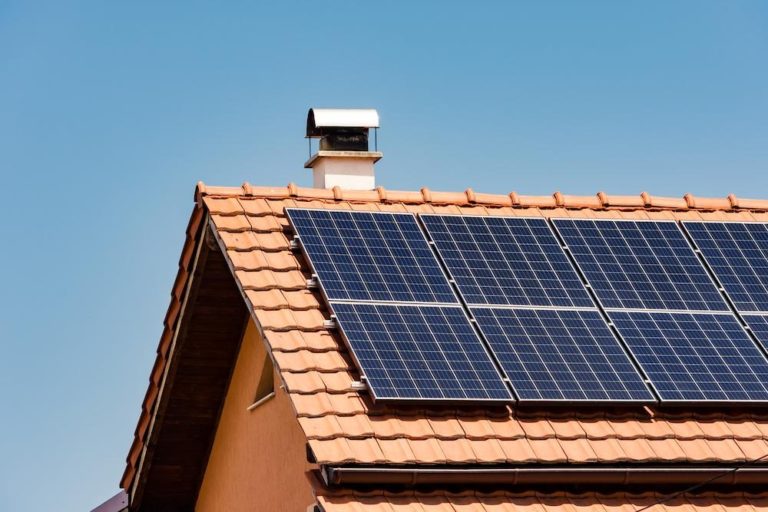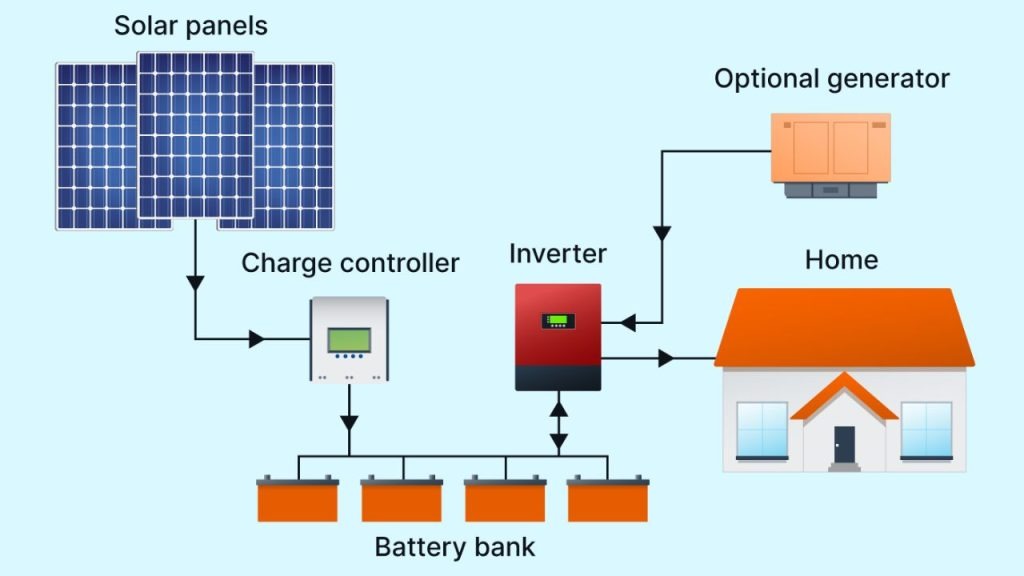- General
- Updated on February 5, 2025
How to Choose the Right Solar System for Your Home

In the modern era, many homeowners are making the switch to solar energy as a sustainable and cost-effective solution to power their homes. Solar systems provide an excellent way to reduce your carbon footprint, lower energy bills, and contribute to the health of the planet. However, choosing the right solar system for your home can be a daunting task due to the variety of options available. This blog post will guide you through the key factors you need to consider when selecting the perfect solar system for your home.
Understanding Your Solar Needs
Before you begin shopping for a solar system, it’s important to understand your home’s energy needs. Knowing how much energy you use on a daily basis will help you determine the right solar system size and ensure that you choose a system that meets your requirements.
Assessing Your Current Energy Usage
Start by reviewing your electricity bill to understand your energy consumption. Pay attention to the monthly usage in kilowatt-hours (kWh). This will give you a baseline understanding of how much energy your home consumes. Additionally, consider the peak hours of electricity usage in your home. If you have appliances that use a lot of power, such as air conditioning or electric heaters, these will need to be factored into your energy needs.
Considering Future Energy Usage
When choosing a solar system, think about how your energy usage might change in the future. Are you planning on purchasing electric vehicles, adding new appliances, or expanding your home? These changes could increase your energy consumption, so it’s a good idea to account for them when determining the right solar system size.
Types of Solar Systems for Homes
Once you’ve assessed your energy needs, you can start looking into the types of solar systems available. There are three main types of solar systems that homeowners typically consider:
1. Grid-Tied Solar Systems
A grid-tied solar system is the most common type of system for homeowners. This system is connected to the utility grid, meaning that it generates solar power during the day, and any excess energy is sent back to the grid. At night, when your solar panels are not producing electricity, you can draw power from the grid as usual.
Pros:
- Lower upfront cost compared to other systems.
- Energy backup provided by the grid during nighttime or cloudy days.
- Potential to earn credits or compensation for excess energy sent to the grid.
Cons:
- No energy storage for power outages unless you install a separate battery backup system.
- Reliance on the grid for power during times when solar production is low.
2. Off-Grid Solar Systems
Off-grid solar systems are ideal for homeowners who live in remote areas with limited access to the utility grid. These systems operate independently and rely on batteries to store excess energy generated by the solar panels for use during nighttime or cloudy days.

Pros:
- Complete energy independence, with no reliance on the utility grid.
- Ideal for homes in remote locations or those looking for energy self-sufficiency.
Cons:
- Higher initial cost due to the need for batteries.
- Requires more maintenance and management to ensure sufficient energy storage.
3. Hybrid Solar Systems
Hybrid solar systems combine the features of grid-tied and off-grid systems. These systems are connected to the grid, but they also incorporate battery storage, allowing homeowners to store excess energy for later use. Hybrid systems provide the best of both worlds, as you can draw energy from the grid when necessary but also rely on your stored solar energy during power outages or low solar production times.
Pros:
- Offers energy independence with the ability to store solar energy for later use.
- Can provide backup power during outages, even if the grid goes down.
- More flexibility in managing energy consumption.
Cons:
- Higher upfront cost due to the inclusion of battery storage.
- Requires more complex system design and maintenance.
Determining the Right Solar System Size
Once you’ve decided on the type of solar system you want, the next step is determining the right size. The size of your solar system will depend on several factors, including your energy consumption, the available space for installation, and the amount of sunlight your location receives.
Calculating Solar Panel Output
The power output of solar panels is typically measured in watts (W), and the total output of a solar system is determined by the number of panels and their individual wattage. For example, if each solar panel produces 300W of energy, and you install 20 panels, your system will generate a total of 6,000W (or 6kW) of power.
To determine the number of solar panels you need, divide your home’s daily energy consumption (in kWh) by the average daily energy production of each panel. Keep in mind that this will vary based on factors such as your location, roof orientation, and panel efficiency.
Considering Your Roof Space
The amount of space available on your roof plays a significant role in the size of the solar system you can install. Typically, a 1kW solar system requires about 100 square feet of roof space. If you have a small roof or limited space, you may need to choose high-efficiency panels that produce more power per square foot.
Additionally, consider the orientation and tilt of your roof. South-facing roofs tend to receive the most sunlight, making them ideal for solar panel installation. If your roof is shaded or has obstructions like chimneys or vents, it may affect the amount of sunlight your panels receive.
Local Climate and Sunlight Availability
The amount of sunlight your location receives will directly impact the performance of your solar system. If you live in a sunny region, you will need fewer panels to meet your energy needs. On the other hand, areas with frequent cloud cover or limited sunlight may require a larger system to generate the same amount of power.
Many solar providers can perform a site assessment and provide a tailored recommendation based on your location’s sunlight levels.
Solar Panel Efficiency and Quality
When choosing a solar system, the efficiency of the solar panels is an important consideration. Panel efficiency refers to the amount of sunlight a panel can convert into usable energy. Higher efficiency panels tend to have a higher cost, but they can generate more power in less space, which is important if you have a limited roof area.
Look for panels with a proven track record of performance, high efficiency, and long warranties. Many reputable manufacturers offer 25-year warranties, ensuring that your panels will continue to perform well over time.
Also Read : Top 10 Indian Startups You NEED to Know About
Solar System Cost and Incentives
The cost of a solar system can vary widely based on the type of system, size, and the quality of the components used. On average, homeowners can expect to pay between $10,000 to $30,000 for a fully installed system, including panels, inverter, and installation.
Before making a purchase, check if there are any government incentives, rebates, or tax credits available in your area. Many countries and states offer financial incentives to reduce the upfront cost of solar systems, making the switch more affordable.
Choosing the Right Solar Provider
Finally, choosing a reputable solar provider is crucial to ensure that your solar system is installed and maintained correctly. Look for providers with experience, positive reviews, and a proven track record of successful installations. Ask for quotes from multiple companies to compare pricing and services.
Make sure the provider offers ongoing support and maintenance to keep your system running smoothly for years to come.
Conclusion
Choosing the right solar system for your home involves a detailed evaluation of your energy needs, roof space, local climate, and budget. By understanding the different types of solar systems, calculating your energy consumption, and selecting the right system size, you can make an informed decision that suits your lifestyle and energy goals.
Investing in solar energy is not only a smart financial decision but also a step towards reducing your carbon footprint and contributing to a more sustainable future. Take the time to research and choose the best solar system for your home, and you’ll enjoy the benefits of clean, renewable energy for years to come.
Join the discussion
Related Articles
No results available
ResetTrending Articles


- General
- Updated on July 30, 2025


- General
- Updated on July 28, 2025


- General
- Updated on July 24, 2025


- Fashion
- Updated on July 22, 2025


- General
- Updated on July 25, 2025


- General
- Updated on July 28, 2025


- General
- Updated on July 23, 2025


- Tourism
- Updated on July 19, 2025


- Health
- Updated on July 16, 2025


- General
- Updated on July 16, 2025
No results available
Reset


